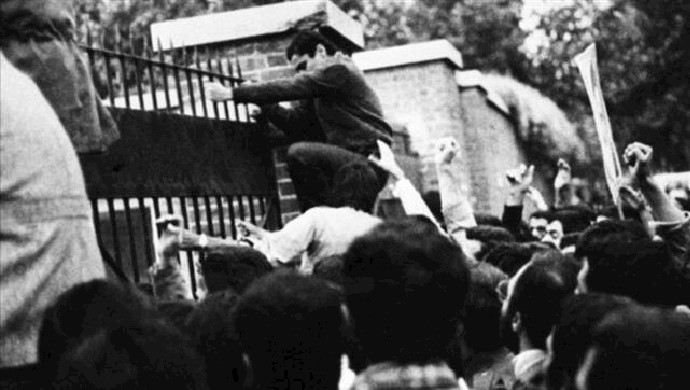Analysis by PMOI/MEK
Iran, November 4, 2019—Forty years after Iranian regime thugs stormed the United States Embassy in Tehran on November 4, 1979, many of those involved on that day are now enjoying high positions in the mullahs’ hierarchy.
Fifty-two U.S. Embassy diplomats and employees were held hostage for 444 days. Senior officials of Iran's regime, including former president Mahmoud Ahmadinejad, and others continue to hold key positions, as if rewarded for their crimes. Despite showing their loyalty to the regime time and again, some of these individuals were actually dubbed as “moderates” by pro-appeasement circles in the West seeking rapprochement and engagement with the mullahs’ regime.
The list of these senior Iranian regime figures also includes Masoumeh Ebtekar, current Vice President in Women and Family Affairs, who was the spokeswoman for the hostage-takers. She strongly defended the detention of Americans during that period and even demanded court trials.
The U.S. Embassy takeover in Tehran marked the beginning of the mullahs’ hostage-taking policy and blackmailing the international community. This policy has gained official nature and become institutionalized as part of Tehran’s actual foreign policy posture.
Following four decades of terrorism and blackmail as the cornerstones of its foreign policy, the mullahs’ regime is now recognized as the world’s leading state sponsor of terrorism. Tehran has constantly resorted to hostage takings, all under a variety of pretexts.
Exclusive-A comprehensive report on the #Iranian regime's #terrorism:#Iran Terrorism | Iranian Regime Aggression https://t.co/Qi64x9Sdym#FreeIran #IranRegimeChange
— NCRI-FAC (@iran_policy) 28 October 2019
Hundreds of thousands of innocent people, if not millions, have fallen victim to Tehran’s wrath of terror and its terror groups checkered across the Middle East, Asia, Africa, and even Latin America. As a result, terrorism and hostage-taking are now considered a major branch of the Iranian regime’s DNA.
The 1979 U.S. embassy takeover, later dubbed by regime officials as a “revolution greater than the 1979 revolution,” actually had the objective of eliminating Iran’s democratic forces, and specifically the People’s Mojahedin Organization of Iran (PMOI), or Mujahedin-e-Khalq (MEK), as its political rival. Iranian regime founder Ruhollah Khomeini, supreme leader at the time, backed the initiative of storming and taking over the U.S. Embassy. Ali Khamenei, the current Supreme Leader, at the Khomeini’s representative in Tehran, was one of the main supporters of the takeover. Khamenei later went to the embassy himself and encouraged the mob.
Meet the hostage-takers who now run #Iran's government
Read more: #NCRI Special Report – US Embassy Hostage Takers Now Hold Top Positions in Iran's Regime: https://t.co/Ew3ZI9GzFj#NoImpunity4Mullahs pic.twitter.com/4xRSB4jzWb
— NCRI-FAC (@iran_policy) 4 November 2019
As expected, last week Khamenei encouraged Tehran-backed Iraqi militias known as the Hashd al-Shaabi (Popular Mobilization Forces), funded, armed, trained and now commanded by Iran’s Revolutionary Guards (IRGC) Qods Force, to take over the U.S. Embassy in Baghdad based on the same model in Tehran four decades ago.
Hossein Shariatmadari, editor and Khamenei’s representative in Kayhan daily, called for the takeover of the U.S. Embassy by Iraqi militias in the paper’s October 30 editorial. Kayhan is known as Khamenei’s mouthpiece.
The editorial reads in part: “In a previous note, by mentioning the takeover of the U.S. embassy in Iran, which [Khomeini] called the ‘second revolution,’ the issue was raised in the context of a question that why the Iraqi revolutionary youths … are not ending the presence of the U.S. Embassy in Baghdad, which is the epicenter of conspiracy and espionage against the innocent people of Iraq!? And why are you not eliminating and throwing out this infected wound from your holy land? The takeover of the U.S. espionage center in Islamic Iran and eliminating that epicenter of conspiracy had many benefits for us. So why are the revolutionary youths of Iraq depriving their holy land from these benefits?”





